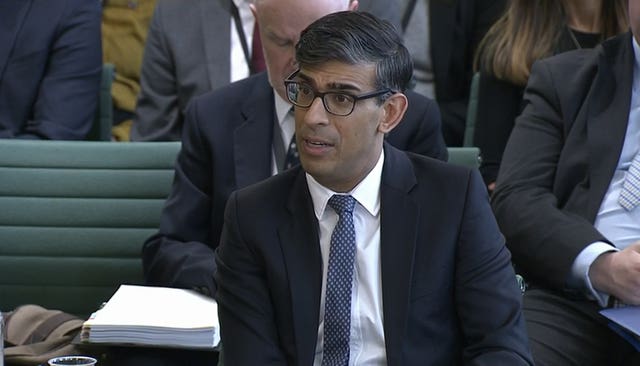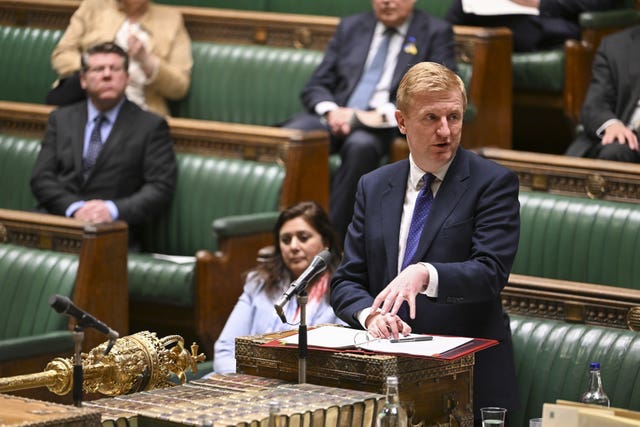
The UK’s approach to China is “more robust” than most of its allies, the Prime Minister has insisted following demands for a tougher line on Beijing.
At one of his regular grillings by select committee chairs, Rishi Sunak was challenged on the Government’s reluctance to act on a number of Chinese-owned companies such as Bytedance, which owns TikTok.
He rejected the suggestion from Liam Byrne, Labour MP and chairman of the Commons Business and Trade Committee, that while other nations acted to protect themselves against China, the UK was merely “thinking about it”.
Mr Sunak told the Commons Liaison Committee: “Our approach to China is undoubtedly more robust than, I’d say, most of our allies.”
He pointed to European countries not removing Huawei equipment from their telecommunications networks, not placing similar restrictions on exports of sensitive technology to China and said the UK’s foreign investment regime was the most recently implemented and therefore the most robust, among other examples.
He added: “I am entirely confident that our approach to dealing with the risk that China poses is very much in line with our allies and in most cases goes further in protecting ourselves.”

Mr Byrne, who has raised concerns about the influence of Chinese-owned businesses such as Bytedance, replied: “It clearly doesn’t.”
The Prime Minister’s defence of the UK’s China policy comes after the Government blamed Beijing for “malicious” cyber attacks on parliamentarians and the Electoral Commission, sanctioning some of those involved.
Backbench Conservatives, however, criticised the Government’s actions, saying it had not gone far enough, while others renewed their calls for China to be labelled a “threat”.
Education Secretary Gillian Keegan told Times Radio on Tuesday morning that China was “obviously a security threat”, but Downing Street has been keen to play down the possibility that the Government could change its language on the country, which it currently calls as an “epoch-defining challenge”.
The Prime Minister’s official spokesman said: “There isn’t a mechanism under UK law or indeed in our G7 or Five Eyes countries that has a designation process like that.”
Cabinet tensions have reportedly surfaced over the issue, with some ministers pushing for tougher action on Beijing while others are resistant over concerns it could harm economic and trade relations.

Tuesday also saw the charge d’affairs at the Chinese embassy attend the Foreign Office following a formal summons to account for his country’s actions.
The Foreign Office said it had set out an “unequivocal condemnation” of “malicious cyber activity” by organisations affiliated to Beijing, saying it “would not tolerate such threatening activity, and would continue to take strong action with partners across the globe to respond”.
The attribution of the cyber attacks to the APT31 hacking group, believed to be under the control of the Chinese Ministry of State Security, was part of a coordinated effort with the UK’s allies, including the US and New Zealand.
US authorities announced sanctions against the same front company and individuals as the UK, and also said it had charged seven individuals with computer misuse and fraud offences.
New Zealand alleged hackers linked to the Chinese government launched a state-sponsored operation that targeted the country’s parliament in 2021 but said it lacked the legal powers to impose sanctions.
The Chinese government has strongly denied that it has carried out, supported or encouraged cyber attacks on the UK, describing the claims as “completely fabricated and malicious slanders”.
A spokesman for China’s embassy in London said: “China has always firmly fought all forms of cyber attacks according to law.
“China does not encourage, support or condone cyber attacks.
“At the same time, we oppose the politicisation of cyber security issues and the baseless denigration of other countries without factual evidence.
“We urge the relevant parties to stop spreading false information and stop their self-staged, anti-China political farce.”

Enjoy the convenience of having The Sunday Post delivered as a digital ePaper straight to your smartphone, tablet or computer.
Subscribe for only £5.49 a month and enjoy all the benefits of the printed paper as a digital replica.
Subscribe